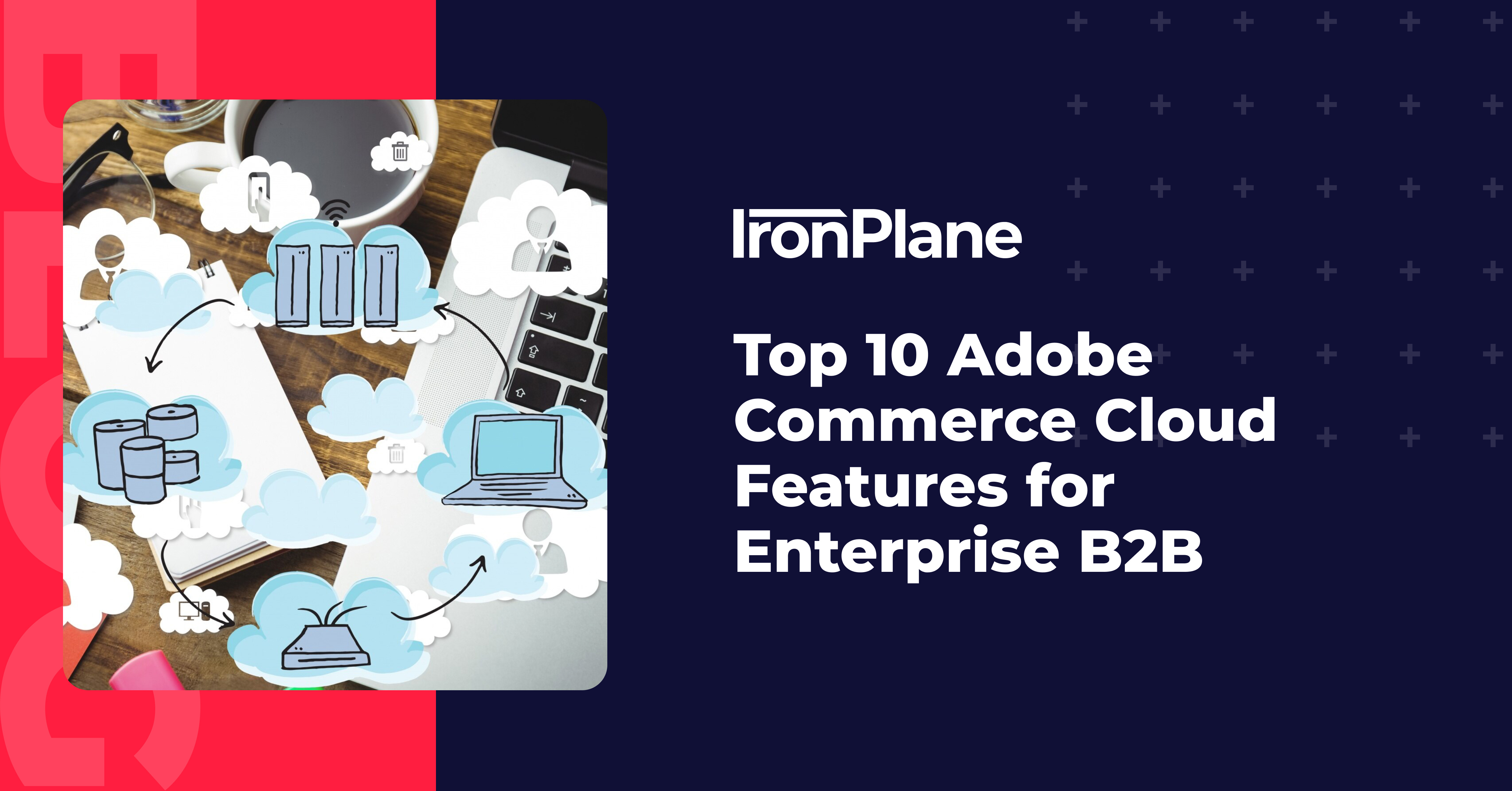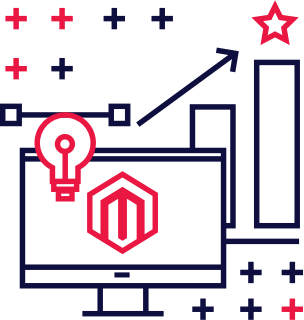eCommerce Platform Pricing: Adobe Commerce Cloud & Magento Open Source
Find an eCommerce solution that fits both your needs and budget with this guide comparing the pricing of Magento Open Source and Adobe Commerce.

Adobe Commerce Cloud is a powerful platform for large-scale B2B operations. Let's explore the top features that make it stand out for enterprise companies.
| Feature | Benefit |
|---|---|
| Scalable Account Management | Handles 100,000+ customer accounts with complex structures |
| Custom Catalogs and Pricing | Supports up to 500 customer groups with personalized offerings |
| Advanced Quote Management | Streamlines B2B negotiation process |
| AI-Driven Personalization | Enhances customer experience with tailored recommendations |
| Seamless ERP Integration | Compatible with 98% of major ERP systems |
Adobe Commerce Cloud can handle over 100,000 customer accounts, perfect for big B2B operations. It lets you set up complex account structures, so you can organize your customers just the way you need. This means you can manage lots of different business relationships easily, all in one place.
The platform also supports creating different roles within each account. This is super helpful for B2B companies where multiple people might be involved in making purchases. You can set up buyers, approvers, and administrators, each with their own permissions. This way, everyone can do their job without stepping on each other's toes.
Additionally, the system allows for hierarchical account structures, which is crucial for large corporations with multiple divisions or subsidiaries. Each sub-account can have its own settings, catalogs, and pricing, while still being part of the larger organizational structure. This level of flexibility ensures that even the most complex B2B relationships can be accurately represented and managed within the platform.
B2B development on Adobe Commerce Cloud is all about making things easier for both you and your customers. With these account management tools, you're setting the stage for smooth business relationships. If you're looking to implement or customize these features, our Adobe Commerce development team can help you tailor the platform to meet your exact B2B needs.
One of the coolest things about Adobe Commerce Cloud is how it lets you personalize what different customers see. You can create up to 500 different customer groups, each with its own special catalog and prices. This is huge for B2B, where you might have different deals for different types of customers.
Imagine you're selling office supplies. With custom catalogs, you could show small businesses a different set of products than you show to big corporations. Maybe the small businesses see more budget-friendly options, while the big companies see bulk deals. And with custom pricing, you could offer better rates to your biggest customers without showing those prices to everyone.
The platform also supports dynamic pricing rules, allowing you to set up complex pricing structures based on various factors such as order quantity, customer loyalty, or specific contract terms. This means you can automate your pricing strategy to reflect the nuances of your business relationships, saving time and ensuring consistency across all transactions.
This level of customization helps you treat each customer like they're special - because they are! It's a great way to build loyalty and keep your B2B customers coming back. If you want to learn more about making the most of these features, check out our ecommerce consulting services.

In the B2B world, negotiation is key. Adobe Commerce Cloud makes this process smooth with its advanced quote management system. Customers can request quotes directly from their account, and your sales team can respond quickly and easily.
The system keeps track of all the back-and-forth, so nothing gets lost in endless email chains. Your team can add notes, adjust prices, and even attach files to quotes. This makes it easy to handle complex orders or special requests.
What's really cool is how this ties in with the rest of the platform. Once a quote is approved, it can turn into an order with just a click. This saves time and cuts down on mistakes that can happen when moving between different systems.
The quote management system also supports multi-level approvals, which is crucial for many B2B operations. You can set up workflows where quotes above a certain value need to go through multiple approval stages before being finalized. This ensures that all necessary stakeholders are involved in high-value transactions, maintaining proper oversight and control.
For more on how to streamline your B2B processes, check out our Magento development agency services.

Adobe Commerce Cloud uses some pretty cool AI tech called Adobe Sensei. This isn't just a fancy add-on - it's baked right into the platform to make shopping easier and more personal for your customers.
The AI looks at what each customer has bought before, what they've looked at, and even how they move around your site. Then it uses this info to show them products they're more likely to want. It's like having a super smart sales assistant for each customer, working 24/7.
But it's not just about product recommendations. The AI also makes search results better. If a customer types in "blue widgets", the system doesn't just show all the blue widgets. It figures out which blue widgets that specific customer is most likely to want, based on their history and behavior. This can make a big difference in how quickly customers find what they need - and in B2B, time is money.
The AI-driven personalization extends to the entire customer journey. It can help tailor the homepage layout, adjust product descriptions to highlight features that particular customer values most, and even customize email marketing campaigns. This level of personalization can significantly improve conversion rates and customer satisfaction in the B2B space, where relationships and understanding client needs are paramount.
Want to learn more about how AI can boost your B2B sales? Check out our article on Adobe Commerce AI features.

For big B2B operations, having your online store talk to your back-end systems is super important. Adobe Commerce Cloud is great at this - it can connect with pretty much any ERP system you're using. In fact, it's compatible with 98% of major ERP systems out there.
What does this mean in practice? Well, let's say you get a big order through your online store. With ERP integration, that order info goes straight into your inventory system. Your stock levels update automatically, so you always know exactly what you have on hand. And if prices change in your ERP, they'll update on your website too, in real time.
This kind of seamless connection helps prevent mistakes and saves a ton of time. No more manual data entry or worrying about whether your systems are in sync. It's all handled automatically, letting you focus on growing your business instead of managing data.
The integration capabilities go beyond just inventory and pricing. You can sync customer data, order history, and even complex pricing rules between your ERP and Adobe Commerce Cloud. This ensures that your sales team, customer service representatives, and other departments all have access to the same up-to-date information, leading to better decision-making and improved customer service.
If you need help setting up these integrations, our Magento development services team can lend a hand.

When you're dealing with a large catalog of products, having a good search function is crucial. Adobe Commerce Cloud uses Elasticsearch, which is like the Ferrari of search engines. It's fast, accurate, and can handle complex queries with ease.
But it's not just about speed. The search function in Adobe Commerce Cloud is smart. It can handle misspellings, recognize related terms, and even understand context. So if a customer types in "screwdiver" instead of "screwdriver", they'll still find what they're looking for.
The platform also supports faceted search, which is a fancy way of saying customers can filter results easily. They might start by searching for "laptops", then narrow it down by brand, price range, or specific features. This is super helpful in B2B where buyers often know exactly what specs they need.
For B2B customers with very specific needs, the platform offers advanced search capabilities like SKU search, attribute-based search, and even the ability to search through product documentation. This means that whether a customer is looking for a specific part number or trying to find products that meet certain technical specifications, they can quickly and easily find exactly what they need.
All of this adds up to a 99.9% uptime guarantee, ensuring your customers can always find what they need. If you want to make sure your site is running as fast as possible, check out our Magento 2 speed optimization services.
When you're handling big B2B transactions, security is super important. Adobe Commerce Cloud takes this seriously. The platform has PCI DSS 3.2.1 Level 1 certification, which is the highest level of security for processing credit card payments.
But it's not just about protecting payment info. The platform also has advanced fraud protection built in. It uses machine learning to spot suspicious activity, helping to prevent fraud before it happens. This is really important in B2B where transactions can be large and complex.
Adobe also keeps the platform updated with the latest security patches. This means you don't have to worry about keeping up with every new security threat - Adobe's team is on it. They're constantly working to keep your data and your customers' data safe.
In addition to these measures, Adobe Commerce Cloud offers features like two-factor authentication, IP whitelisting, and role-based access controls. These allow you to add extra layers of security to sensitive areas of your B2B platform, ensuring that only authorized personnel can access critical information or make important changes.
If you want to make sure your site is as secure as possible, our Magento 2 hosting services include extra security measures.
These days, customers expect to be able to shop however they want - online, in-store, or through a sales rep. Adobe Commerce Cloud makes this easy with its omnichannel capabilities. It gives you a single view of your customers across all channels, so you can provide a consistent experience no matter how they choose to shop.
For example, a customer might start researching products on their phone, add items to their cart on their work computer, and then finish the purchase by talking to a sales rep. With Adobe Commerce Cloud, all of this info is synced up. The sales rep can see what's in the cart and pick up right where the customer left off.
The platform also integrates with Adobe Experience Cloud, which adds even more omnichannel features. You can manage content, personalize experiences, and track customer journeys across all your channels from one place.
For B2B companies, the omnichannel approach extends to things like order management and customer service. A customer might place an order online but then call to make changes. With Adobe Commerce Cloud, your customer service team can easily access and modify the order, ensuring a smooth experience for the customer regardless of how they choose to interact with your company.
Want to learn more about the latest Adobe Commerce features? Check out our article on Adobe Commerce Cloud unveiled at Adobe Summit.

Adobe Commerce Cloud uses what's called a "headless" architecture. This might sound complicated, but it's actually pretty cool. Basically, it separates the front-end (what customers see) from the back-end (where all the data and processes live).
Why is this good for B2B? Well, it gives you a ton of flexibility. You can create custom front-end experiences for different customer groups, or even for different devices. Maybe you want a super simple mobile interface for customers who are often on the go, and a more detailed desktop version for office-based purchasers. With headless commerce, you can do that.
The platform uses an API-first approach, which means it's easy to connect Adobe Commerce Cloud to other systems or apps. This is great for B2B companies that might need to integrate with lots of different tools or create custom applications.
Headless architecture also allows for faster updates and innovations. You can make changes to the front-end without touching the back-end, and vice versa. This means you can quickly adapt to changing market conditions or customer needs without having to overhaul your entire system. For B2B companies that need to stay agile in competitive markets, this can be a game-changer.
If you're trying to decide if Adobe Commerce Cloud is right for your business, our guide on Magento Open Source and Adobe Commerce Cloud for enterprise companies might help.

In B2B, making smart decisions often comes down to having good data. Adobe Commerce Cloud gives you tons of data about your business, all in real-time. You can see things like sales numbers, customer behavior, and inventory levels as they happen.
But it's not just about collecting data - it's about making sense of it. The platform comes with customizable dashboards, so you can set up reports that show exactly what you need to see. Maybe you want to track which product categories are selling best, or which customer groups are most profitable. You can set that up easily.
The analytics tools also help you spot trends and opportunities. You might notice that certain products often sell together, or that sales of a particular item spike at certain times of year. This kind of insight can help you make better decisions about inventory, marketing, and product development.
For B2B companies, the platform offers advanced reporting features like customer segmentation analysis, lifetime value calculations, and detailed purchase history reports. These tools can help you identify your most valuable customers, understand their buying patterns, and tailor your strategies to better serve their needs. You can also track key B2B metrics like average order value, repeat purchase rate, and customer acquisition cost.
If you want to dive deeper into what Adobe Commerce can do for your business, check out our article on what is Adobe Commerce.

Adobe Commerce Cloud is packed with features that make it a great choice for enterprise B2B companies. From its ability to handle complex account structures and custom pricing, to its advanced search and analytics tools, it's built to support large-scale operations.
The platform's focus on security, its flexible architecture, and its integration capabilities mean it can adapt to the unique needs of different businesses. And with features like AI-driven personalization and omnichannel support, it's ready to help B2B companies provide the kind of smooth, personalized shopping experience that customers have come to expect.
If you're considering Adobe Commerce Cloud for your business, or if you want to make sure you're getting the most out of your current setup, we're here to help. Our team at IronPlane specializes in Adobe Commerce hosting and development. We can help you set up, optimize, and maintain your Adobe Commerce Cloud platform, ensuring you're making the most of all these powerful features.
Supports intricate B2B account hierarchies and custom pricing models
Powerful tools for product discovery and data-driven insights
Tailored shopping experiences for B2B customers
Seamless integration across multiple sales channels

Find an eCommerce solution that fits both your needs and budget with this guide comparing the pricing of Magento Open Source and Adobe Commerce.
Our B2B eCommerce platform comparison guide reviews six of the most popular solutions and includes advice on how to research & compare your options.

B2B companies face unique challenges when migrating their Magento e-commerce platforms. As online shopping changes, businesses need to keep up. Let's look at the main problems, solutions, and success stories in B2B Magento migration.